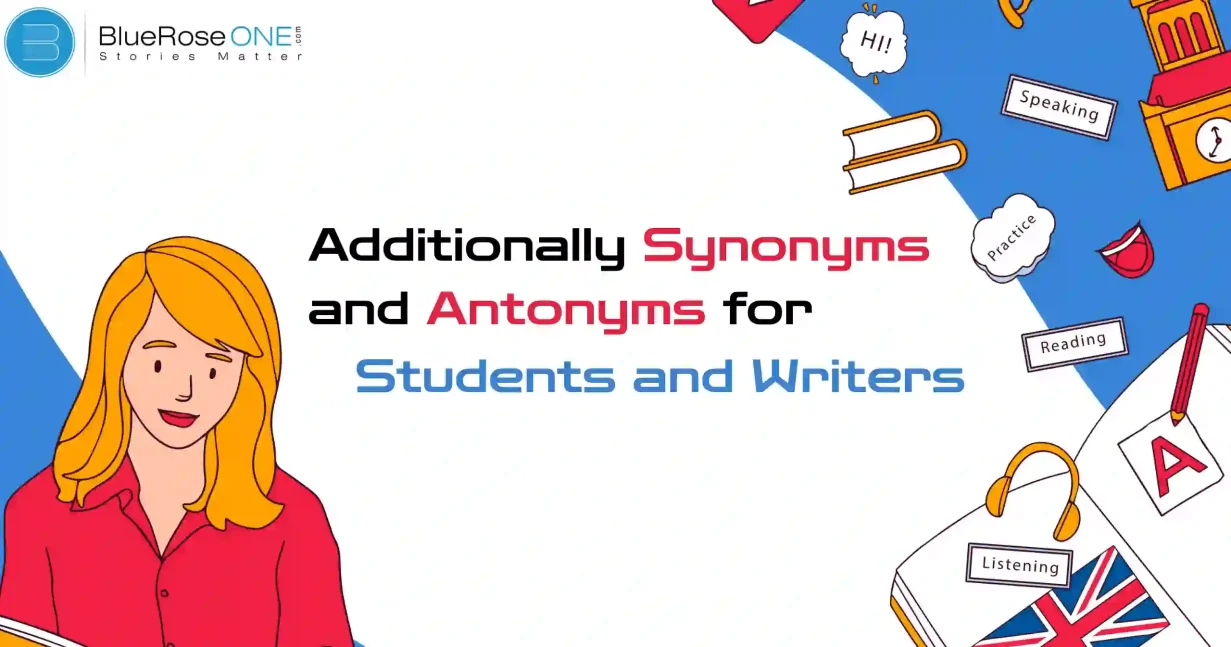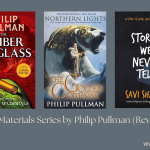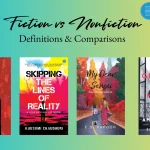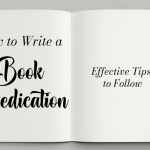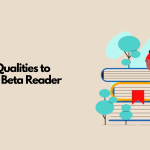We’ve all used the word “additionally” more times than we can count, especially if you’re a student, writer, or someone who deals with a lot of text. But have you ever stopped to think about how many different ways you can express that same idea? Or even better, how to say the opposite?
Let’s dig into the synonyms and antonyms of “additionally” in a way that’s easy to understand, super practical, and well additionally useful!
Table of Contents
- What Does “Additionally” Mean?
- Why Understanding Synonyms and Antonyms Is Essential
- Synonyms of “Additionally”
- Antonyms of “Additionally”
- Choosing the Right Synonym or Antonym
- How Students Can Use “Additionally” and Its Synonyms
- How Writers Can Use “Additionally” and Its Variants
- Tips for Expanding Your Vocabulary
- Common Mistakes to Avoid
- Conclusion
- Frequently asked questions
What Does “Additionally” Mean?
“Additionally” is an adverb used to show something extra is being added to the conversation or sentence. It’s a way of saying, “Hey, here’s one more thing!”
Example:
“She is smart. Additionally, she’s incredibly kind.”
Basically, it’s the cherry on top.
Why Understanding Synonyms and Antonyms Is Essential
Ever get tired of using the same word over and over? That’s where synonyms and antonyms come to the rescue. They:
- Keep your writing fresh
- Make you sound smarter
- Help you avoid boring repetition
- Enhance your ability to express complex ideas
You may also like: Realistic Fiction: Definition, Key Elements and Examples
Synonyms of “Additionally”
Commonly Used Synonyms
- Also
She sings beautifully. Also, she dances well. - Moreover
He’s hardworking. Moreover, he’s a fast learner. - Furthermore
The report is late. Furthermore, it’s incomplete. - In Addition
In addition to the documents, she submitted a resume. - As Well
- He plays guitar and piano as well.
Formal Synonyms
- Likewise
She passed the test. Likewise, her friend scored high. - In Like Manner
The first team was successful. In like manner, the second team also achieved results. - What’s More
- The car is affordable. What’s more, it’s fuel-efficient.
Informal or Conversational Synonyms
- Plus
He’s a great cook plus, he’s funny! - On Top of That
The movie was boring. On top of that, it was too long. - Not to Mention
- She’s a talented singer not to mention her dancing skills.
Antonyms of “Additionally”
When you’re not adding more but drawing contrast or wrapping up, you’ll need antonyms of “additionally.”
Words That Indicate Opposition or Contrast
- However
She likes ice cream. However, she avoids sugar. - Nevertheless
It was raining. Nevertheless, they played football. - On the Other Hand
- Dogs are loyal. On the other hand, cats are independent.
Words That Suggest a Limit or Finality
- Finally
Finally, the results were announced. - At Last
At last, they found the missing file. - That’s It
We’ve covered all topics. That’s it for today.
You may also like: 100 Adjectives Start with Z (With Meanings & Examples)
Choosing the Right Synonym or Antonym
Based on Tone and Formality
When choosing the right synonym or antonym, tone and formality play a crucial role in determining which word best fits a sentence. Tone refers to the emotional quality or attitude of the language, while formality reflects the level of professionalism or casualness.
For instance, the synonym of “help” can be “assist” or “aid.” In an academic paper or official email, “assist” is more appropriate due to its formal tone, whereas “help” fits well in casual conversations.
Similarly, for the antonym of “happy,” one could use “unhappy” in a neutral context, but “miserable” might suit a more emotional or dramatic tone.
Writers must evaluate both the setting and the audience to select words that match the intended impact. Making the wrong choice can lead to miscommunication or seem out of place in the given context.
Based on Sentence Context
When selecting the right synonym or antonym, it’s crucial to consider sentence context, as words that appear similar can carry very different nuances depending on usage.
A synonym may technically mean the same thing but still feel out of place if it doesn’t match the tone, formality, or implied meaning of the sentence.
Context helps determine whether a word fits stylistically, emotionally, and grammatically. Here’s how sentence context influences word choice:
- Example 1:
- Original: “She was additionally responsible for the reports.”
- Incorrect synonym: “She was furthermore responsible for the reports.” (Too formal for casual writing)
- Better fit: “She was also responsible for the reports.” (Matches the tone better)
- Original: “She was additionally responsible for the reports.”
- Example 2:
- Original: “The weather was cold, and additionally, it started to rain.”
- Alternative: “The weather was cold, and on top of that, it started to rain.” (More conversational and vivid)
- Original: “The weather was cold, and additionally, it started to rain.”
- Example 3 (Antonym use):
- Original: “Additionally, he supported the new policy.”
- Opposite context: “On the contrary, he opposed the new policy.” (Accurate antonym based on contrast)
- Original: “Additionally, he supported the new policy.”
These examples show that even slight shifts in word choice can affect clarity, tone, and readability. Always test synonyms and antonyms within the sentence to ensure they align naturally with the intended meaning and style.
You may also like: Shatter Me Series in Order: Complete Reading Guide (2025 Update)
Based on Audience and Purpose
When selecting synonyms or antonyms, understanding your audience and purpose is essential. The right word can clarify meaning, set the tone, and effectively communicate your message.
Whether you are writing a formal academic essay, a creative story, or a casual social media post, the synonym or antonym you choose should align with your intended tone and the reading level of your audience.
Formal contexts often demand precise, elevated vocabulary, while informal settings benefit from simple, relatable language.
Examples:
- Formal Academic Writing:
- Instead of “help,” use assist or facilitate.
- Antonym: Instead of “lazy,” use unmotivated or inactive.
- Instead of “help,” use assist or facilitate.
- Creative Writing:
- Instead of “sad,” use melancholy or heartbroken to evoke deeper emotion.
- Antonym: Instead of “bright,” use gloomy or dim to create an atmosphere.
- Instead of “sad,” use melancholy or heartbroken to evoke deeper emotion.
- Casual/Everyday Writing or Speech:
- Instead of “difficult,” use tough or hard.
- Antonym: Instead of “fast,” use slow or sluggish.
- Instead of “difficult,” use tough or hard.
Choosing synonyms and antonyms with the audience and purpose in mind not only improves clarity but also enhances your writing’s impact and appropriateness.
You may also read: Throne of Glass Series in Order: A Chronological Order Guide
How Students Can Use “Additionally” and Its Synonyms
In Academic Writing
In academic writing, the word “additionally” and its synonyms such as furthermore, moreover, in addition, and what’s more are essential for building cohesive arguments and logically extending ideas.
These transitional words help students link evidence, elaborate on theories, and introduce supporting points without sounding repetitive.
Using a variety of synonyms keeps the tone formal and prevents the writing from becoming monotonous. Proper use of these connectors also strengthens the flow of thought and improves the clarity of academic arguments.
Examples of usage in academic writing:
- Additionally, recent studies confirm the hypothesis proposed by earlier researchers.
- Furthermore, this approach minimizes environmental impact while maintaining efficiency.
- Moreover, the data supports the claim that social media influences political awareness.
- In addition, this method proved more cost-effective than traditional techniques.
- What’s more, the survey revealed a growing preference for hybrid work models.
These transition words allow students to present multiple ideas in a structured manner, making their arguments more persuasive and easier to follow.
In Essays and Reports
In academic writing, such as essays and reports, the word “additionally” and its synonyms like “furthermore,” “moreover,” “in addition,” and “also” are essential for building strong, coherent arguments.
These transition words help students add supporting information, connect ideas smoothly, and enhance the logical flow of their writing. Using them correctly can strengthen a paper’s persuasiveness and readability.
Here are some examples of how students can use these terms in essays and reports:
- Additionally: “The study reveals a high dropout rate among first-year students. Additionally, it highlights a lack of mental health support on campuses.”
- Furthermore: “The data supports the initial hypothesis. Furthermore, it introduces new variables worth investigating.”
- Moreover: “The policy is outdated. Moreover, it fails to address the needs of marginalized communities.”
- In addition: “In addition to environmental concerns, the project poses significant financial risks.”
- Also: “The curriculum needs revision. It also requires better teacher training programs.”
By incorporating these transition words appropriately, students can present ideas in a logical sequence and maintain reader engagement throughout their work.
In Class Presentations
When delivering class presentations, students can enhance the flow and clarity of their speech by using transition words like additionally and its synonyms such as moreover, furthermore, in addition, and also.
These terms help link ideas smoothly, making arguments more persuasive and easier to follow. Here’s how students can use them effectively:
- Additionally: “The Industrial Revolution improved production methods. Additionally, it transformed labor systems worldwide.”
- Moreover: “Climate change affects biodiversity. Moreover, it contributes to extreme weather events.”
- Furthermore: “Our research supports the theory. Furthermore, it aligns with previous academic findings.”
- In addition: “She scored highest in math. In addition, she led the science project successfully.”
- Also: “The author uses vivid imagery. Also, the dialogue is emotionally compelling.”
Using these transition words in oral presentations not only strengthens logical sequencing but also demonstrates command over academic language, an essential skill for students aiming to impress both peers and educators.
You may also like: 100 Words to Describe Music: From Classical to Rock and Beyond
How Writers Can Use “Additionally” and Its Variants
In Blog Articles
Blog writers often use “additionally” and its synonyms to enhance the flow of ideas and offer extra information without sounding repetitive. These transition words help maintain reader engagement by smoothly connecting one thought to another.
Whether the writer is building a list of features, adding supporting points, or offering alternative perspectives, words like moreover, furthermore, in addition, or what’s more keep the tone polished and professional. Such variants also make the content more SEO-friendly by enriching the vocabulary.
Examples:
- Original: “This skincare cream hydrates the skin. Additionally, it reduces signs of aging.”
- Improved with synonyms: “This skincare cream hydrates the skin. Moreover, it reduces signs of aging.”
- Original: “The book offers practical writing tips. Additionally, it includes exercises at the end of each chapter.”
- With variation: “The book offers practical writing tips. In addition, it includes exercises at the end of each chapter.”
- List-building example: “This laptop is affordable. Furthermore, it has a long battery life and a sleek design.”
By diversifying these transitions, blog articles become more engaging and easier to read, enhancing both clarity and SEO value.
In Fiction and Non-Fiction
In both fiction and non-fiction writing, transitional words like “additionally” and its variants such as moreover, furthermore, in addition, and also play a key role in creating cohesion and expanding on ideas.
They help writers smoothly introduce new points, develop arguments, or add layers to character actions and dialogue. In fiction, these words enrich narrative flow and deepen character motivations.
In non-fiction, they are vital for building logical arguments, listing evidence, or elaborating on previously stated facts.
Examples:
- Fiction Example:
“She wasn’t just brave during the storm. Additionally, she risked her life to save the children.”
→ Shows the character’s layered courage, adding emphasis to her actions. - Non-Fiction Example:
“The climate is rapidly changing due to human activities. Furthermore, recent studies confirm that deforestation plays a major role.”
→ Strengthens the argument with supporting evidence. - Memoir Example:
“My father taught me discipline. In addition, he modeled unwavering honesty.”
→ Helps build a complex character portrayal in reflective writing. - Essay Example:
“Exercise improves mental health. Moreover, it contributes to better sleep and stress management.”
→ Expands the main idea using a clear, informative tone.
Using “additionally” and its synonyms adds clarity, professionalism, and flow, making both storytelling and informative writing more compelling and organized.
You may also read: 150 Useful Tone Words to Describe Tone | Explanation with Examples
In Technical or Creative Writing
In both technical and creative writing, the word “additionally” and its variants (such as “furthermore,” “moreover,” or “in addition”) play a crucial role in linking ideas smoothly and building logical progression.
These transition words help maintain coherence, clarify connections between points, and add emphasis where needed whether it’s in an analytical report or a fictional narrative. Writers can use these terms to present supplementary details, reinforce arguments, or introduce new layers of meaning.
Examples:
- Technical Writing:
“The software update improves performance. Additionally, it addresses several security vulnerabilities.”
→ This use of additionally helps highlight a secondary but important benefit of the update. - Creative Writing:
“Her voice was calm and steady. Moreover, she never once raised her tone, even under pressure.”
→ Here, moreover deepens the character portrayal by layering in more descriptive insight. - Instructional Writing:
“Ensure the wires are disconnected before handling the panel. In addition, wear protective gloves at all times.”
→ In addition, it serves to reinforce safety by introducing an extra precaution. - Narrative Writing:
“The journey was long and treacherous. Furthermore, they had no map to guide them.”
→ Furthermore intensifies the challenge faced by the characters, enriching the plot tension.
By choosing the right variant based on tone and context, writers can strengthen the flow and persuasiveness of their content.
You may also like: HEA Meaning in Books, Texts, and Pop Culture Explained
Tips for Expanding Your Vocabulary
- Read a variety of genres fiction, nonfiction, blogs, academic journals
- Use a thesaurus with caution (not every synonym fits every context)
- Practice rewriting sentences using different synonyms
Common Mistakes to Avoid
- Overusing One Word: Don’t lean too hard on “additionally.” It gets dull fast.
- Using Inappropriate Synonyms: “Plus” might work in a blog post not in a thesis!
- Misunderstanding Context: Don’t replace “additionally” with “however” unless the meaning fits.
Conclusion
The word “additionally” is a super useful tool in writing and speech. But just like any tool, overusing it can make your work feel dull. Swapping it out with the right synonyms or even choosing the perfect antonym can totally transform your writing.
Whether you’re a student trying to impress your teacher or a writer aiming to hook readers, mastering these alternatives will definitely level up your language game.
Frequently asked questions
1. What’s the best synonym for “additionally” in academic writing?
“Moreover” or “furthermore” are the most suitable for formal academic tone.
2. Is “plus” a good replacement for “additionally”?
Yes, but it’s more casual and should be used in informal writing or speech.
3. Can “however” be the antonym of “additionally”?
Absolutely. “However” contrasts ideas, making it a useful antonym.
4. How can I avoid repeating “additionally” in my essay?
Use a mix of synonyms like “in addition,” “also,” and “moreover.” Vary sentence structure too.
5. Where can I practice synonym and antonym exercises?
Try language apps, vocabulary websites, or create your own practice using textbooks and articles.

